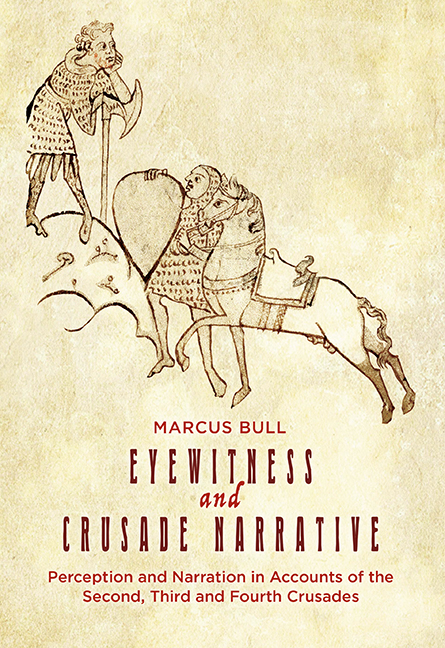 Eyewitness and Crusade Narrative
Eyewitness and Crusade Narrative Book contents
- Frontmatter
- Dedication
- Contents
- Acknowledgements
- Abbreviations
- Introduction: Medieval and Modern Approaches to Eyewitnessing and Narratology as an Analytical Tool
- 1 Memory and Psychological Research into Eyewitnessing
- 2 The Second Crusade: The De Expugnatione Lyxbonensi and Odo of Deuil's De Profectione Ludovici VII in Orientem
- 3 The Third Crusade: Ambroise's Estoire de la Guerre Sainte and Points of Comparison and Contrast
- 4 Geoffrey of Villehardouin's and Robert of Clari's Narratives of the Fourth Crusade
- Conclusion
- Bibliography
- Index
2 - The Second Crusade: The De Expugnatione Lyxbonensi and Odo of Deuil's De Profectione Ludovici VII in Orientem
Published online by Cambridge University Press: 12 February 2019
- Frontmatter
- Dedication
- Contents
- Acknowledgements
- Abbreviations
- Introduction: Medieval and Modern Approaches to Eyewitnessing and Narratology as an Analytical Tool
- 1 Memory and Psychological Research into Eyewitnessing
- 2 The Second Crusade: The De Expugnatione Lyxbonensi and Odo of Deuil's De Profectione Ludovici VII in Orientem
- 3 The Third Crusade: Ambroise's Estoire de la Guerre Sainte and Points of Comparison and Contrast
- 4 Geoffrey of Villehardouin's and Robert of Clari's Narratives of the Fourth Crusade
- Conclusion
- Bibliography
- Index
Summary
Although the reaction of western writers of history to the Second Crusade was a good deal more muted than to the First, we are fortunate in having two substantial monograph-type texts written by participants: an anonymous account of the Christian conquest of Lisbon in 1147, told largely from the perspective of the Anglo-Norman contingent of crusaders who – alongside others from north-western Europe – made a decisive contribution to the victory; and an account, written by Odo, monk and future abbot of St-Denis, of the progress of the expeditions to the east up to early 1148, with particular reference to the French contribution under the leadership of King Louis VII. The two texts have a good deal in common: in the main body of their narratives they cover similar stretches of time at comparable length; they are both cast in epistolary form; they are both the work of authors whose former scholarly reputations as literary mediocrities is now being revised by more positive evaluations of their learning and skill as writers; and the authors were well-situated participants in the events that their texts narrate. The two narratives therefore provide useful points of comparison and contrast in examining whether and in what ways eyewitnessing informs the content and presentation of their respective stories; the extent to which autopsy is invoked as a source of authority and a guarantee of accuracy; the construction of the narratorial voices; the nature of the narrators’ homodiegetic presence within their storyworlds and the reach of their gazes; and the thematic emphases that undergird the narration.
The De Expugnatione Lyxbonensi
The work conventionally known as De expugnatione Lyxbonensi (The Conquest of Lisbon) serves as an excellent illustration of the ways in which a text's thematic, substantive and structural emphases can have a close bearing on questions of individual and group agency, which in turn influence the distribution and plot functions of acts of seeing and focalization. The identities of those within the text who are described perceiving aspects of the storyworld and of the action taking place within it, and just as importantly forming understandings based on those perceptions, are closely bound up with the narrator's plot choices and the forms of human interaction that are narrated.
- Type
- Chapter
- Information
- Eyewitness and Crusade NarrativePerception and Narration in Accounts of the Second, Third and Fourth Crusades, pp. 126 - 192Publisher: Boydell & BrewerPrint publication year: 2018


